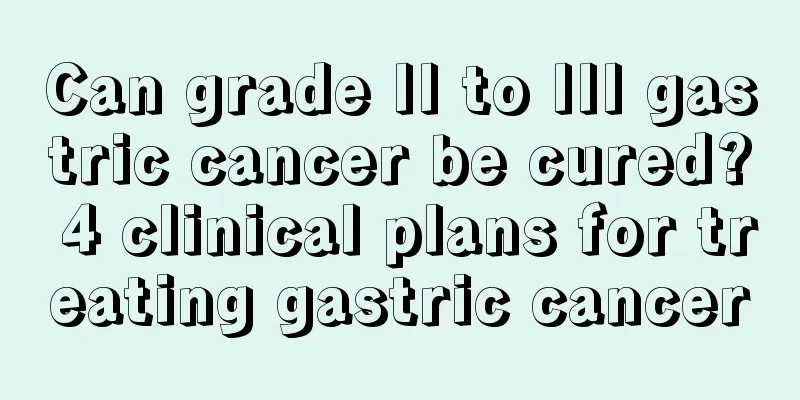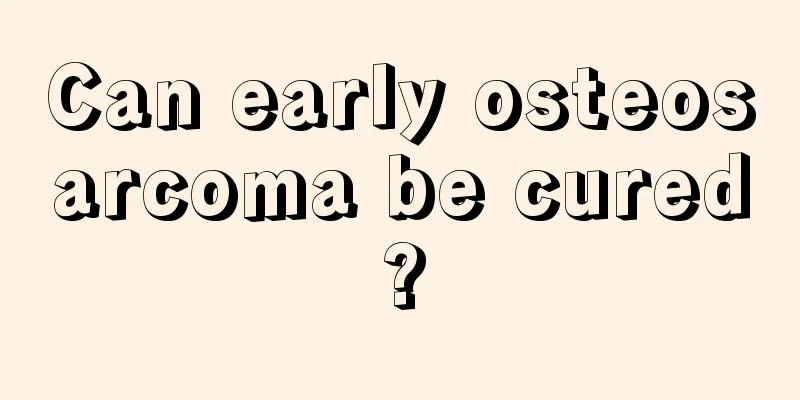Can grade II to III gastric cancer be cured? 4 clinical plans for treating gastric cancer

|
Can gastric cancer of grade 2 to 3 be cured? Gastric cancer is a common malignant tumor, a killer of health, and a great threat to people's health. Patients diagnosed with mid- to late-stage gastric cancer are not equivalent to being issued a death notice. As long as they are treated properly, there is hope for recovery. Let's take a look at the experts' introduction. What are the symptoms of stomach cancer? More than 70% of early gastric cancer is asymptomatic. According to the pathogenesis, the symptoms of advanced gastric cancer can be divided into four aspects. 1. Energy consumption and metabolic disorders caused by the spread of cancer. Leading to low resistance, malnutrition, vitamin deficiency, etc. Characterized by fatigue, loss of appetite, nausea, weight loss, anemia, edema, fever, constipation, dry skin and hair loss. 2. Gastric cancer ulcers cause upper abdominal pain, gastrointestinal bleeding, perforation, etc. Gastric cancer pain is often a bite. There is no clear relationship with eating or it worsens after eating, such as peptic ulcer pain. Eating or taking antacids can relieve symptoms. This situation may last for a long time. Then the pain gradually worsens and persists, characterized by positive fecal occult blood test, vomiting blood or black stool. 5% of patients have heavy bleeding. There are even first-time acute abdomen, such as gastric cancer bleeding or perforation. 3. Symptoms caused by the mechanical effects of cancer. For example, a feeling of fullness and heaviness due to poor stomach filling. In addition to loss of taste, anorexia, pain, nausea, vomiting, etc., stomach cancer located near the heart can also invade the esophagus. It can cause hiccups and difficulty swallowing. Located near the pylorus can cause pyloric obstruction. 4. Symptoms caused by swelling, spread and metastasis, such as ascites, hepatomegaly, jaundice and metastasis to the lungs, brain, heart, prostate, ovaries, bone marrow, etc. For patients with mid- to late-stage gastric cancer, the possibility of cure is relatively small, but treatment can control the disease, shrink the tumor, and prolong survival time. Generally speaking, for patients with mid-stage gastric cancer who can undergo surgery, surgery is the first choice. For patients who cannot undergo surgery, chemotherapy combined with traditional Chinese medicine is mainly used for treatment. While combining traditional Chinese and Western medicine to treat tumors, the patient's own anti-tumor ability is improved. In principle, gastric cancer is treated with surgery, and chemotherapy is necessary after surgery. It is recommended to use the chemotherapy regimen of Xeloda + Oxaliplatin. The latest report shows that this regimen can significantly prolong the patient's survival. After gastric cancer resection, the diet should be gradually increased, mainly high-protein and high-fat, and sweets should be avoided. Solid food is recommended, and small meals should be eaten frequently. Water can be drunk 30 minutes after meals. It is best to lie flat for 20-30 minutes after meals to prevent dumping syndrome. At the same time, avoid rough food such as unprocessed corn, sorghum, wheat, etc. Eat less fried, salted and smoked foods, and eat more fresh vegetables, fruits, milk and vitamins. For patients with advanced gastric cancer, the main purpose of receiving diagnosis and treatment is to improve the quality of life and prolong life. While receiving effective diagnosis and treatment measures, patients can also enhance their resistance and increase their confidence in defeating the disease by eating. In the late stage of cancer, Chinese medicine should be taken for comprehensive conditioning, promoting blood circulation and removing blood stasis, clearing away heat and detoxifying, softening and dispersing nodules. Chinese medicine has strong anti-cancer effect. For example, ginsenoside Rh2 (life-protecting element) with a content of 16.2% can inhibit the growth and proliferation of cancer cells, fight inflammation and relieve pain, and increase the patient's appetite. It is a very good auxiliary treatment drug for patients with advanced cancer. It can prolong the patient's survival period and improve his quality of life to a certain extent. The treatment of gastric cancer is the same as that of other malignant tumors. Surgery should be the first choice, and comprehensive treatments such as chemotherapy, radiotherapy, traditional Chinese medicine and immunotherapy should be reasonably combined according to the situation. Stage II gastric cancer belongs to mid-stage gastric cancer, which is mainly treated with surgical resection, sometimes with auxiliary chemotherapy or immunotherapy. Stage III gastric cancer often invades surrounding tissues and has extensive lymph node metastasis. Although surgical resection is the main treatment, it should be combined with chemotherapy, radiotherapy, immunotherapy and traditional Chinese medicine. Stage IV gastric cancer is already in the advanced stage and is usually treated with non-surgical treatment. For patients who are suitable for surgery, the primary and metastatic lesions are removed as much as possible, and chemotherapy, radiotherapy, immunotherapy, and traditional Chinese medicine are combined with other treatments. Surgical treatment is divided into radical surgery, palliative surgery and short-circuit surgery. 1. Radical surgical resection: This concept is relative, referring to the subjective judgment that the tumor has been completely removed and the treatment effect can be achieved, but in fact only a part of it can be cured. 2. Palliative resection: refers to the subjective judgment that the tumor cannot be completely removed, but the main tumor mass can be removed. Removal of the tumor can relieve symptoms, prolong life, and create conditions for further comprehensive treatment. 3. Short-circuit surgery: It is mainly used for cases with pyloric obstruction where surgical resection is impossible. Gastrojejunostomy can relieve the obstruction. 4. Radiotherapy: 1) Preoperative radiotherapy: refers to the preoperative local irradiation for some advanced gastric cancers, where the tumor can be felt clinically, to improve the resection rate. 200 cGY each time, 5 times/week, for 4 weeks, totaling 4000 cGY. Surgery is performed 10-14 days after stopping radiotherapy. It can increase the local resection rate, but cannot affect the degree of lymph node metastasis. It takes 6 weeks before surgery. Therefore, the impact on 5-year survival is difficult to estimate. 2) Intraoperative radiotherapy: refers to a high-dose irradiation of the surgical field centered on the celiac artery after tumor resection and before establishing gastrointestinal anastomosis, preferably 3000-3500 cGY. It can increase the 5-year survival rate of advanced gastric cancer by about 10%. During the operation, ensure that the intestines are isolated from the irradiation field to prevent the occurrence of radiation complications. |
>>: How to treat lung metastasis cancer? Can targeted drugs treat lung metastasis cancer?
Recommend
What are the symptoms of ovarian tumors
Knowing the symptoms of the disease is the guaran...
What are the ointments for blisters at the corners of the mouth
Blisters at the corners of the mouth are a common...
Proper foot massage is very important
Nowadays, there are actually many ways to maintai...
Apoptosis Balance Therapy
Apoptosis balance therapy is a treatment method t...
Several uses of baking soda
There are many things on the market that everyone...
What should I do if my contact lens moves behind my eyeball?
Do you want to wear glasses to be more fashionabl...
Is it good to do scraping and cupping regularly?
There is an old saying that "scraping and cu...
What to do if the cervical spine is afraid of cold and wind
Neck means the neck. The cervical vertebrae are t...
New drug for polycystic ovary syndrome
Polycystic kidney disease is actually a congenita...
How to care for fur
Fur clothing is generally made of animal fur, so ...
Why do I always choke when eating
I believe that many people have experienced choki...
Choked by saliva while sleeping
In life, choking on saliva is a very common pheno...
Vagus nerve stimulation surgery
Many people are not particularly familiar with th...
How to detoxify the body?
As the body continues to grow and develop, it pro...
Why do I always lose a lot of hair
Everyone loses hair every day. From a physiologic...









